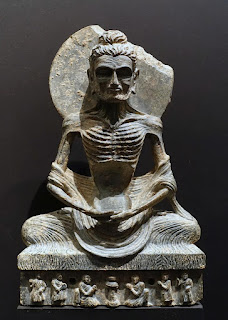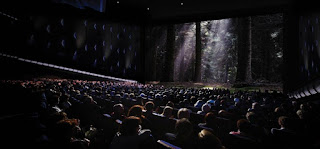How Fasting Connects Us to the World of the Dead
Estimated read time | 4 min
Fasting throughout cultures has been a custom related to religious traditions and practices, although there isn't full clarity about the real origins of the practice, most people see it as an act of self sacrifice which in its religious context is perfectly fitting.
But could there perhaps be a more complex reason for the origins of the practice? Some sort of gateway to true enlightenment being this a key factor in the stories of ‘Enlightenment’ from the two protagonists from the current largest religions in the world?Early Christianity/Buddhism, Two Sides of the Same Coin
As previously analyzed the stories of ‘Enlightenment’ of Jesus and the Buddha are practically the same, with the core components of meeting the devil (and being confronted/tempted by him/her), long periods of ‘extreme fasting’ and overcoming the experience with new gained knowledge of upmost importance, a burning desire to share it, and, allegedly, supernatural abilities.
While these two religions seem opposite at a glance they actually share many similarities, especially when removing the dogma and studied in-depth, including apocryphal scriptures from early Christianity which included accounts of Jesus dealing with concepts like ‘samsara’ or reincarnation or more common ideas such as the relationship between the real concept of ‘sin’ and ‘karmic seeds’, but this will be covered at the end of the 1st and on the 2nd part of the -Outline-.
All and all we can see patterns emerging in the stories when studied in-depth, not only between these two but other philosophies and stories from ancient Hindu concepts like the veil of Maya and modern reports from people going through ASC (Altered States of Consciousness) where people claim to have gone through similar experiences like that of the Buddha and Jesus, like seeing previous lives or coming to contact with this all encompassing force which is full of intelligence and ties, perhaps the very fabric of the universe together, something that Jesus might’ve called ‘the Spirit’.
Coming back to what got these two personages to such a life-changing experience, how truly did they gain such knowledge? Was it that their self-sacrifice was such that it was noted from ‘God’ so that he/she opted to share its mysteries?
Perhaps there’s a more -Rational- explanation, while the idea of wandering through the desert without food for forty days or sitting below a tree until your ‘vanes dry’, might’ve been extreme examples of a rather more traditional ritual custom, they might’ve been necessary to achieve the goal at hand but not for the most obvious reasons.
The concept of deep meditation to reach wisdom or contact with the divine is much older than the stories of these iconic personages going back to India around 5000 to 3500 BCE, through migration, conquests, and cultural expansions this idea might’ve leaked into the Abrahamic customs, this is especially true in Kabbalah.
However, what made it so that going to the extreme, so far as to not taste food until achieving such a state of mind was a necessary part of the ritual?
The Path of Self-Sacrifice vs Mindfulness
Coming back to what got these two personages to such a life-changing experience, how truly did they gain such knowledge? Was it that their self-sacrifice was such that it was noted from ‘God’ so that he/she opted to share its mysteries?
Perhaps there’s a more -Rational- explanation, while the idea of wandering through the desert without food for forty days or sitting below a tree until your ‘vanes dry’, might’ve been extreme examples of a rather more traditional ritual custom, they might’ve been necessary to achieve the goal at hand but not for the most obvious reasons.
The concept of deep meditation to reach wisdom or contact with the divine is much older than the stories of these iconic personages going back to India around 5000 to 3500 BCE, through migration, conquests, and cultural expansions this idea might’ve leaked into the Abrahamic customs, this is especially true in Kabbalah.
However, what made it so that going to the extreme, so far as to not taste food until achieving such a state of mind was a necessary part of the ritual?
Borderline Near-Death Experience
There are many ways in which modern reports of ASC are achieved, whether it is through natural means like using -Sleep Paralysis- as a way to have a full OBE (Out of body experience) or Astral Projection as it is commonly known to the use of Entheogens, which are currently being researched due to their potential benefits to treating mental health disorders.
But perhaps the most common, impactful, and documented reports from the modern research come from NDE’s (Near Death Experiences) where people who were close to losing their lives in a variety of ways go into an ASC experience where a large ratio of reports are coming with the same or a very similar story of what lies on ‘the other side’.
These reports include similar themes to the stories of ‘Enlightenment’ from Buddha and Jesus, from reaching a state of pure bliss, love, understanding, happiness and joy in the shape of pure light, which the Buddha termed as ‘Nirvana’ to not so positive experiences where people find themselves in ‘hellish’ environments tormented often by their own beliefs in similar fashion to Buddha and Jesus encountering this challenging ‘trickster’ figure who seems to be trying to deceive them.
And while the reports lead us into the idea that there is something else beyond this life, beyond what we conceive reality and the research brings more questions than answers, it is very likely that ascetics practiced this extreme form of ‘mindfulness’ to achieve a borderline NDE which in turn has led many in the past and in current times to share their experiences with a burning heart.
More about the 'Enlightenment stories of Jesus and Buddha ...


